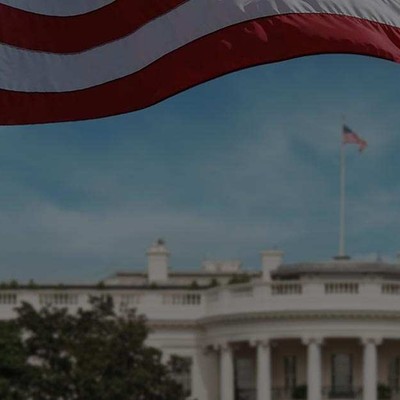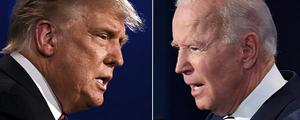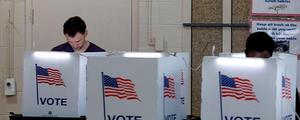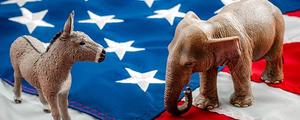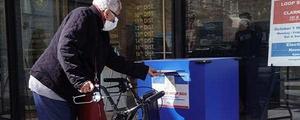The economy typically figures as a defining issue in presidential elections involving incumbents, shaping how the president is rated overall and, in turn, how he fares in the election. This year, the economy seems like more of a bystander as President Donald Trump is trailing former Vice President Joe Biden in national trial heats.
A review of Gallup's latest polling on the economy -- all conducted before the first presidential debate and Trump's subsequent COVID-19 diagnosis -- found Americans expressing less negative views of the U.S. economy and somewhat positive attitudes toward Trump's handling of it. At that time:
- Americans' direct ratings of the economy were negative, on balance, but not as negative as earlier in the pandemic.
- Few Americans (9%) considered any aspect of the economy to be the nation's top problem.
- A majority (54%) rated Trump positively for his job performance on the economy.
- A majority (55%) also considered themselves and their family to be better off than they were four years ago.
Gallup records indicate that ratings like these would normally be associated with a 50% or better overall job approval rating.
The fact that Trump continues to fall short of the 50% mark indicates that other aspects of his leadership are overriding the economy in their assessment.
Still, Americans say the economy will be the No. 1 issue important to their vote, another key Gallup finding from September -- so better understanding how the public views the issue may provide insights into the election's potential outcome.
National Economic Ratings Mildly Negative
Gallup's Economic Confidence Index summarizes Americans' views of the economy on two dimensions: how they rate current economic conditions and whether they believe the economy is getting better or worse. The index has a theoretical range from a high of +100 to a low of -100.
As Gallup reported last month, the Economic Confidence Index (ECI) has gradually increased, from this year's low point of -33 in April to -10 in early September.

Line graph. Gallup's economic confidence index for January through September 2020. The Gallup economic confidence index currently sits at -10, up from -16 in August.
If the ECI continues to rise over the next month, it could be close to the zero midpoint of the index by Election Day. That would suggest the economic climate in the final days of the 2020 campaign would be similar to where it was in 2004 and 2012 when George W. Bush and Barack Obama won second terms. It would certainly be far less negative than in 1992 when George H.W. Bush lost his bid for reelection, but far less positive than in 1996 when Bill Clinton won his.
| Economic Confidence Index | |||||||||||||||||||||||||||||||||||||||||||||||||||||||||||||||||||||||||||||||||||||||||||||||||||
|---|---|---|---|---|---|---|---|---|---|---|---|---|---|---|---|---|---|---|---|---|---|---|---|---|---|---|---|---|---|---|---|---|---|---|---|---|---|---|---|---|---|---|---|---|---|---|---|---|---|---|---|---|---|---|---|---|---|---|---|---|---|---|---|---|---|---|---|---|---|---|---|---|---|---|---|---|---|---|---|---|---|---|---|---|---|---|---|---|---|---|---|---|---|---|---|---|---|---|---|
| Trump (2020 Aug/Sep) | -10 | ||||||||||||||||||||||||||||||||||||||||||||||||||||||||||||||||||||||||||||||||||||||||||||||||||
| Obama (2012 Oct/Nov) | -1 | ||||||||||||||||||||||||||||||||||||||||||||||||||||||||||||||||||||||||||||||||||||||||||||||||||
| G.W. Bush (2004 Oct) | +1 | ||||||||||||||||||||||||||||||||||||||||||||||||||||||||||||||||||||||||||||||||||||||||||||||||||
| Clinton (1996 Oct) | +23 | ||||||||||||||||||||||||||||||||||||||||||||||||||||||||||||||||||||||||||||||||||||||||||||||||||
| G.H.W. Bush (1992 Aug/Sep) | -37 | ||||||||||||||||||||||||||||||||||||||||||||||||||||||||||||||||||||||||||||||||||||||||||||||||||
| 2012 based on mode-adjusted index to align measure collected on Gallup Daily tracking to measures collected on Gallup cross-sectional polls | |||||||||||||||||||||||||||||||||||||||||||||||||||||||||||||||||||||||||||||||||||||||||||||||||||
| Gallup | |||||||||||||||||||||||||||||||||||||||||||||||||||||||||||||||||||||||||||||||||||||||||||||||||||
Economy Is Not a Top-of-Mind Problem
Americans appear even less worried about the economy when asked to name the most important problem facing the country. Altogether, 9% of Americans in Gallup's September poll mentioned at least one of several economic issues as the nation's top problem -- mostly citing the economy in general (5%) or unemployment (2%) in response to this open-ended question. No other reelection year has featured less than 40% of Americans naming economic issues as the nation's most important problem, making 2020 a remarkable year in this regard.
| Mentions of economy (net) | |||||||||||||||||||||||||||||||||||||||||||||||||||||||||||||||||||||||||||||||||||||||||||||||||||
|---|---|---|---|---|---|---|---|---|---|---|---|---|---|---|---|---|---|---|---|---|---|---|---|---|---|---|---|---|---|---|---|---|---|---|---|---|---|---|---|---|---|---|---|---|---|---|---|---|---|---|---|---|---|---|---|---|---|---|---|---|---|---|---|---|---|---|---|---|---|---|---|---|---|---|---|---|---|---|---|---|---|---|---|---|---|---|---|---|---|---|---|---|---|---|---|---|---|---|---|
| % | |||||||||||||||||||||||||||||||||||||||||||||||||||||||||||||||||||||||||||||||||||||||||||||||||||
| Trump (2020 Aug/Sep) | 9 | ||||||||||||||||||||||||||||||||||||||||||||||||||||||||||||||||||||||||||||||||||||||||||||||||||
| Obama (2012 Oct) | 72 | ||||||||||||||||||||||||||||||||||||||||||||||||||||||||||||||||||||||||||||||||||||||||||||||||||
| G.W. Bush (2004 Oct) | 40 | ||||||||||||||||||||||||||||||||||||||||||||||||||||||||||||||||||||||||||||||||||||||||||||||||||
| Clinton (1996 Jul) | 40 | ||||||||||||||||||||||||||||||||||||||||||||||||||||||||||||||||||||||||||||||||||||||||||||||||||
| G.H.W. Bush (1992 Aug/Sep) | 69 | ||||||||||||||||||||||||||||||||||||||||||||||||||||||||||||||||||||||||||||||||||||||||||||||||||
| Gallup | |||||||||||||||||||||||||||||||||||||||||||||||||||||||||||||||||||||||||||||||||||||||||||||||||||
Americans are more likely to name the government/poor leadership (25%), the coronavirus (25%) or race relations (13%) as the nation's top problem than to name any aspect of the economy.
Majority Approve of Trump's Handling of Economy
The economy remained Trump's strong suit last month among several issues on which Gallup asks the public to rate him. As of Sept. 14-28, when Trump's overall job approval rating stood at 46%, 54% of Americans approved of his handling of the economy. Trump's economic approval rating exceeded his ratings on crime (48%), foreign affairs (46%), China (46%), the coronavirus (44%) and race relations (38%).
Compared with past incumbents' approval ratings on the economy in the final preelection poll, Trump fares relatively well -- but not on his overall rating.
Trump's 54% job approval rating on the economy last month is second only to Bill Clinton's 57% in 1996 and puts him in league with other presidents -- including Ronald Reagan, Obama and George W. Bush -- who won reelection.
| Job approval on economy | Overall job approval | ||||||||||||||||||||||||||||||||||||||||||||||||||||||||||||||||||||||||||||||||||||||||||||||||||
|---|---|---|---|---|---|---|---|---|---|---|---|---|---|---|---|---|---|---|---|---|---|---|---|---|---|---|---|---|---|---|---|---|---|---|---|---|---|---|---|---|---|---|---|---|---|---|---|---|---|---|---|---|---|---|---|---|---|---|---|---|---|---|---|---|---|---|---|---|---|---|---|---|---|---|---|---|---|---|---|---|---|---|---|---|---|---|---|---|---|---|---|---|---|---|---|---|---|---|---|
| % | % | ||||||||||||||||||||||||||||||||||||||||||||||||||||||||||||||||||||||||||||||||||||||||||||||||||
| Trump (2020 Sep) | 54 | 46 | |||||||||||||||||||||||||||||||||||||||||||||||||||||||||||||||||||||||||||||||||||||||||||||||||
| Obama (2012 Nov) | 45 | 52 | |||||||||||||||||||||||||||||||||||||||||||||||||||||||||||||||||||||||||||||||||||||||||||||||||
| G.W. Bush (2004 Oct) | 46 | 48 | |||||||||||||||||||||||||||||||||||||||||||||||||||||||||||||||||||||||||||||||||||||||||||||||||
| Clinton (1996 Oct) | 57 | 54 | |||||||||||||||||||||||||||||||||||||||||||||||||||||||||||||||||||||||||||||||||||||||||||||||||
| G.H.W. Bush (1992 Jul) | 18 | 34 | |||||||||||||||||||||||||||||||||||||||||||||||||||||||||||||||||||||||||||||||||||||||||||||||||
| Reagan (1984 Jul) | 50 | 58 | |||||||||||||||||||||||||||||||||||||||||||||||||||||||||||||||||||||||||||||||||||||||||||||||||
| Overall job approval ratings for Reagan, G.W. Bush and Clinton based on final preelection readings conducted separately in mid- or late October | |||||||||||||||||||||||||||||||||||||||||||||||||||||||||||||||||||||||||||||||||||||||||||||||||||
| Gallup | |||||||||||||||||||||||||||||||||||||||||||||||||||||||||||||||||||||||||||||||||||||||||||||||||||
Americans Still Feel Better Off Today Than Before Trump Took Office
Americans' mildly negative views of the economy seem to have little bearing on how they see their own lives going.
In September, 55% of U.S. adults (including 56% of registered voters) said they and their family are "better off now" than they were four years ago, while 33% said they are worse off. This echoes the 61% of U.S. adults in January who said they were better off than they were three years ago.
The 55% who say they are better off today is also similar to the 53% who rate their personal financial situation as either excellent or good, down only slightly from before the pandemic. Today's "better off" figure is easily the highest Gallup has recorded among comparable points in previous incumbents' presidencies.
| Better off | |||||||||||||||||||||||||||||||||||||||||||||||||||||||||||||||||||||||||||||||||||||||||||||||||||
|---|---|---|---|---|---|---|---|---|---|---|---|---|---|---|---|---|---|---|---|---|---|---|---|---|---|---|---|---|---|---|---|---|---|---|---|---|---|---|---|---|---|---|---|---|---|---|---|---|---|---|---|---|---|---|---|---|---|---|---|---|---|---|---|---|---|---|---|---|---|---|---|---|---|---|---|---|---|---|---|---|---|---|---|---|---|---|---|---|---|---|---|---|---|---|---|---|---|---|---|
| % | |||||||||||||||||||||||||||||||||||||||||||||||||||||||||||||||||||||||||||||||||||||||||||||||||||
| Trump (2020 Sep) | 55 | ||||||||||||||||||||||||||||||||||||||||||||||||||||||||||||||||||||||||||||||||||||||||||||||||||
| Obama (2012 Dec) | 45 | ||||||||||||||||||||||||||||||||||||||||||||||||||||||||||||||||||||||||||||||||||||||||||||||||||
| G.W. Bush (2004 Oct) | 47 | ||||||||||||||||||||||||||||||||||||||||||||||||||||||||||||||||||||||||||||||||||||||||||||||||||
| G.H.W. Bush (1992 Jul) ^ | 38 | ||||||||||||||||||||||||||||||||||||||||||||||||||||||||||||||||||||||||||||||||||||||||||||||||||
| Reagan (1994 Jul) | 44 | ||||||||||||||||||||||||||||||||||||||||||||||||||||||||||||||||||||||||||||||||||||||||||||||||||
| ^ 1992 wording: I'd like you to compare your situation today with what it was four years ago. Are you better off than you were four years ago, or not? | |||||||||||||||||||||||||||||||||||||||||||||||||||||||||||||||||||||||||||||||||||||||||||||||||||
| Gallup | |||||||||||||||||||||||||||||||||||||||||||||||||||||||||||||||||||||||||||||||||||||||||||||||||||
Bottom Line
Most of the recent assessments of the economy that Gallup tracks are on the high side compared with where they stood in the final month of past presidential elections involving incumbents.
The one subpar rating today for a presidential reelection year is the Economic Confidence Index. At -10, it is below the final preelection readings in years that incumbents won reelection: -1 in 2012 (Obama), +1 in 2004 (George W. Bush) and +23 in 1996 (Clinton). However, it is not as negative as the -37 recorded in 1992 before George H.W. Bush lost the election.
Americans rate the economy as more important to their vote this year than any other issue -- 45% say it will be extremely important and 44% very important. However, about half of those rating it as extremely important are Republicans or Republican leaners, and nearly half are Democrats or Democratic leaners, suggesting the economy will cut both ways for Trump as an election issue. Meanwhile, Americans' persistently low satisfaction with the direction of the country, most recently 13%, is a decidedly negative indicator for Trump's reelection.
Republicans and others who recall the strong pre-pandemic economy and credit Trump for creating it may vote for him in hopes that he can revive that economy after the pandemic. Trump's campaign is hoping that swing voters in swing states like Michigan, Pennsylvania and Wisconsin fall into this category. Meanwhile, Democrats and others who believe Trump's COVID-19 policies have contributed to a deeper and longer recession than may have been necessary may vote against him on that basis, making his approval rating on handling COVID-19 a critical metric. Indeed, a candidate's position on COVID-19 also ranks highly as a voting issue for Americans.
Gallup will have one more set of figures for the Economic Confidence Index and Trump's job approval ratings on the issues before Election Day.

